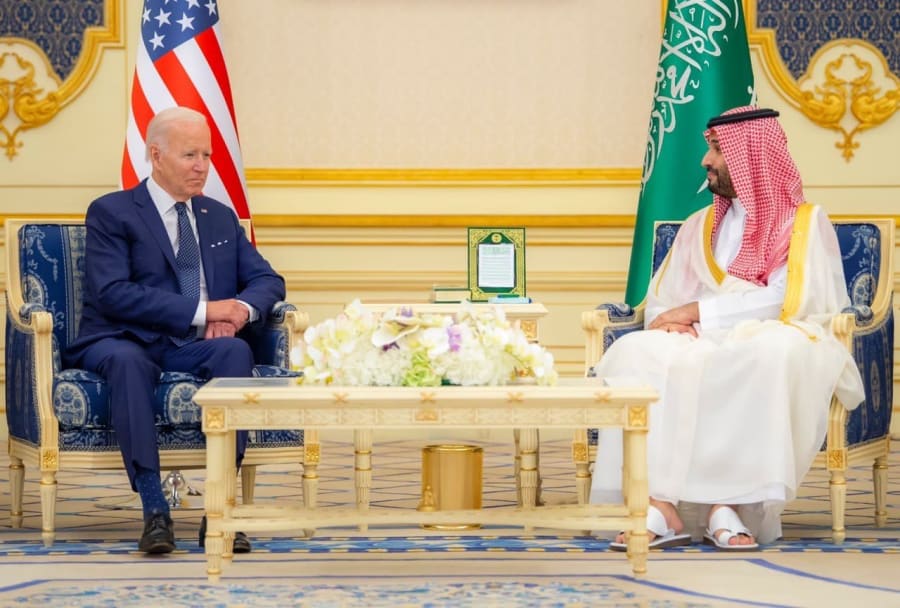WSJ: US and Saudi Arabia agree on the outline of a normalization agreement with Israel
MBS is reportedly not yet ready for an Abraham Accords style deal, but would agree to recognize the Jewish state in exchange for American, Israeli concessions

The U.S. Biden administration and Saudi Arabia have reached a broad understanding on the outline of a Saudi-Israeli peace deal, according to a Wall Street Journal report on Wednesday.
According to the report, U.S. officials have expressed optimism that such a deal could materialize over the next 9 to 12 months. Such a timeline could potentially benefit the Biden 2024 election campaign.
While the White House is interested in pursuing significant progress as soon as possible, the report noted that Saudi Crown Prince Mohammed bin Salman (MBS) has been sending “conflicting messages” about his commitment to the issue.
MBS reportedly told his aides that he is not yet ready to fully normalize ties with Israel in a similar manner to the U.S.-brokered Abraham Accords between Israel and the United Arab Emirates and Bahrain in 2020.
Nevertheless, American and Saudi negotiators are moving forward to discuss the specifics of a potential agreement, according to the WSJ.
The White House response chilled the optimistic headline that reverberated in Israeli media.
U.S. National Security Council spokesperson John Kirby said on Wednesday, "Quite frankly, just to be blunt here, I think the reporting has left some people with the impression that the discussions are farther along and closer to some sense of certainty than they actually are."
"There are still a lot of conversations that have to occur before we get there. Bottom line: there's no agreed-to set of negotiations, there's no agreed-to framework to codify normalization or any of the other security considerations that we and our friends have in the region. But there is a commitment by the administration to keep talking and to keep trying to move things forward," Kirby added.
It is no secret that Riyadh is expecting the U.S. to make significant concessions in exchange for its recognition of the Jewish state. These include “ironclad security guarantees” and help in developing a civilian nuclear program.
U.S. lawmakers on both sides of the aisle are likely to oppose such steps and remind President Joe Biden of his previous reference to the Saudi Kingdom as a “pariah.”
In return for Saudi demands, the U.S. expects the kingdom to narrow down its economic and military relationship with China. American officials told the WSJ that the U.S. may seek assurances from Saudi Arabia that it will allow China to build military bases in its territory and put limits on its usage of Chinese technology. In addition, Washington would wish to settle the ongoing oil price disputes with the Saudis.
The report added that in exchange for peace, Saudi Arabia is also expecting Israel to make “significant concessions” to help promote the creation of a Palestinian state. It did not elaborate on what these steps would entail but stated that Netanyahu’s hardline right-wing coalition would pose a “major hurdle” for negotiators.
For that reason, MBS told his advisors that he was in no rush to get a deal, according to the WSJ report.
On the other side, Israeli Prime Minister Benjamin Netanyahu has downplayed the significance of the Palestinian issue in the talks.
Earlier this week, Netanyahu told Bloomberg News that it comes up “a lot less than you think.”
The WSJ quoted officials as saying the Israeli-Palestinian issue is “one of the least developed points” in the negotiations.
If the U.S. and Saudi Arabia, indeed, agree on “the broad contours of a deal,” as the report suggested, the tables may soon be turned on Israel, which would be required to clarify where it stands on the outline.
In the meantime, Israeli National Security Advisor Tzachi Hanegbi told the WSJ: “At the moment, we don’t even know where to begin. They are still dealing with basic issues between them. So apparently it’s premature even for them to discuss it.”

Tal Heinrich is a senior correspondent for both ALL ISRAEL NEWS and ALL ARAB NEWS. She is currently based in New York City. Tal also provides reports and analysis for Israeli Hebrew media Channel 14 News.













